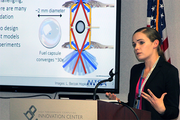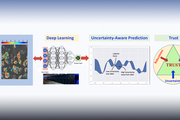Did you know we have a monthly newsletter? View past volumes and subscribe.
CASC team wins best paper at visualization symposium
May 25, 2022 -
A research team from LLNL’s Center for Applied Scientific Computing won Best Paper at the 15th IEEE Pacific Visualization Symposium (PacificVis), which was held virtually on April 11–14. Computer scientists Harsh Bhatia, Peer-Timo Bremer, and Peter Lindstrom collaborated with University of Utah colleagues Duong Hoang, Nate Morrical, and Valerio Pascucci on “AMM: Adaptive Multilinear Meshes.”...
Kevin McLoughlin applies computational biology to complex problems
May 17, 2022 -
Kevin McLoughlin has always been fascinated by the intersection of computing and biology. His LLNL career encompasses award-winning microbial detection technology, a COVID-19 antiviral drug design pipeline, and work with the ATOM consortium. The appeal for him in these projects lies at the intersection of computing and biology. “I love finding ways to visualize data that reveal relationships...
Accelerating the path to precision medicine
March 22, 2022 -
LLNL joined the Transforming Research and Clinical Knowledge in Traumatic Brain Injury (TRACK-TBI) consortium in 2018. The national, multiyear, multidisciplinary effort, led by the University of California at San Francisco in collaboration with Lawrence Berkeley and Argonne national laboratories and other leading research organizations and universities, combines neuroimaging, blood-based...
Machine learning model finds COVID-19 risks for cancer patients
March 10, 2022 -
A new study by researchers at LLNL and the University of California, San Francisco, looks to identify cancer-related risks for poor outcomes from COVID-19. Analyzing one of the largest databases of patients with cancer and COVID-19, the team found previously unreported links between a rare type of cancer—as well as two cancer treatment-related drugs—and an increased risk of hospitalization...
COVID-19 R&D: Computing responds to pandemic
Jan. 19, 2022 -
When the COVID-19 pandemic began, the Laboratory immediately started seeking solutions to the myriad challenges posed by the global crisis. The Computing Directorate jumped right in with research and development activities that combine molecular screening to inform antiviral drug experimentation; a generative molecular design software platform to optimize properties of antiviral drugs; an...
Building confidence in materials modeling using statistics
Oct. 31, 2021 -
LLNL statisticians, computational modelers, and materials scientists have been developing a statistical framework for researchers to better assess the relationship between model uncertainties and experimental data. The Livermore-developed statistical framework is intended to assess sources of uncertainty in strength model input, recommend new experiments to reduce those sources of uncertainty...
Summer scholar develops data-driven approaches to key NIF diagnostics
Oct. 20, 2021 -
Su-Ann Chong's summer project, “A Data-Driven Approach Towards NIF Neutron Time-of-Flight Diagnostics Using Machine Learning and Bayesian Inference,” is aimed at presenting a different take on nToF diagnostics. Neutron time-of-flight diagnostics are an essential tool to diagnose the implosion dynamics of inertial confinement fusion experiments at NIF, the world’s largest and most energetic...
Visualization software stands the test of time
Sept. 13, 2021 -
In the decades since LLNL’s founding, the technology used in pursuit of the Laboratory’s national security mission has changed over time. For example, studying scientific phenomena and predicting their behaviors require increasingly robust, high-resolution simulations. These crucial tasks compound the demands on high-performance computing hardware and software, which must continually be...
60 years of cancer research
Sept. 10, 2021 -
From studying radioactive isotope effects to better understanding cancer metastasis, the Laboratory’s relationship with cancer research endures some 60 years after it began, with historical precedent underpinning exciting new research areas. In one Cancer Moonshot project, research includes a close synergy between experiments and computation, allowing scientists to get a better picture of the...
Brian Gallagher combines science with service
June 20, 2021 -
Brian Gallagher works on applications of machine learning for a variety of science and national security questions. He’s also a group leader, student mentor, and the new director of LLNL’s Data Science Challenge. The Lab has enabled Gallagher to combine scientific pursuits with leadership positions and people-focused responsibilities. “For a long time, my primary motivation was learning new...
COVID-19 detection and analysis with Nisha Mulakken (VIDEO)
June 7, 2021 -
LLNL biostatistician Nisha Mulakken has enhanced the Lawrence Livermore Microbial Detection Array (LLMDA) system with detection capability for all variants of SARS-CoV-2. The technology detects a broad range of organisms—viruses, bacteria, archaea, protozoa, and fungi—and has demonstrated novel species identification for human health, animal health, biodefense, and environmental sampling...
Advanced Data Analytics for Proliferation Detection shares technical advances during two-day meeting
May 7, 2021 -
The Advanced Data Analytics for Proliferation Detection (ADAPD) program held a two-day virtual technical exchange meeting recently. The goal of the meeting was to highlight the science-based and data-driven analysis work conducted by ADAPD to advance the state-of-the-art to accelerate artificial intelligence (AI) innovation and develop AI-enabled systems to enhance the United States’...
Ana Kupresanin featured in FOE alumni spotlight
March 10, 2021 -
LLNL's Ana Kupresanin, deputy director of the Center for Applied Scientific Computing and member of the Data Science Institute council, was recently featured in a Frontiers of Engineering (FOE) alumni spotlight. Kupresanin develops statistical and machine learning models that incorporate real-world variability and probabilistic behavior to quantify uncertainties in engineering and physics...
CASC research in machine learning robustness debuts at AAAI conference
Feb. 10, 2021 -
LLNL’s Center for Applied Scientific Computing (CASC) has steadily grown its reputation in the artificial intelligence (AI)/machine learning (ML) community—a trend continued by three papers accepted at the 35th AAAI Conference on Artificial Intelligence, held virtually on February 2–9, 2021. Computer scientists Jayaraman Thiagarajan, Rushil Anirudh, Bhavya Kailkhura, and Peer-Timo Bremer led...
LLNL physicist wins Young Former Student award
Dec. 16, 2020 -
Texas A&M University’s Department of Nuclear Engineering on December 10 announced it has honored LLNL physicist Kelli Humbird with its 2020-21 Young Former Student award for her work at LLNL in combining machine learning with inertial confinement fusion (ICF) research. Humbird graduated from Texas A&M with a PhD in nuclear engineering in 2019. Since joining the Laboratory as an intern in 2016...
From intern to mentor, Nisha Mulakken builds a career in bioinformatics
Nov. 3, 2020 -
The COVID-19 pandemic has sparked a wave of new research and development at the Lab, and Nisha Mulakken is very busy. The biostatistician has enhanced the Lawrence Livermore Microbial Detection Array (LLMDA) system with detection capability for all variants of SARS-CoV-2. The technology detects a broad range of organisms—viruses, bacteria, archaea, protozoa, and fungi—and has demonstrated...
The internship that launched a machine-learning target revolution
Oct. 1, 2020 -
Kelli Humbird came to LLNL as a student intern and became a teacher of new data science techniques. In this profile, she describes her experiences and the path that led to her research inertial confinement fusion. Read more at the National Ignition Facility.
Advancing healthcare with data science (VIDEO)
Aug. 3, 2020 -
This video provides an overview of projects in which data scientists work with domain scientists to address major challenges in healthcare. To help fight the COVID-19 pandemic, researchers are developing computer models to search for potential antibody and antiviral drug treatments, sharing a data portal with scientists and the general public, and analyzing drug compounds via a novel text...
LLNL papers accepted into prestigious conference
July 9, 2020 -
Two papers featuring LLNL scientists were accepted in the 2020 International Conference on Machine Learning (ICML), one of the world’s premier conferences of its kind. Read more at LLNL News.
Modeling neuronal cultures on 'brain-on-a-chip' devices
June 12, 2020 -
For the past several years, LLNL scientists and engineers have made significant progress in development of a three-dimensional “brain-on-a-chip” device capable of recording neural activity of human brain cell cultures grown outside the body. The team has developed a statistical model for analyzing the structures of neuronal networks that form among brain cells seeded on in vitro brain-on-a...






















